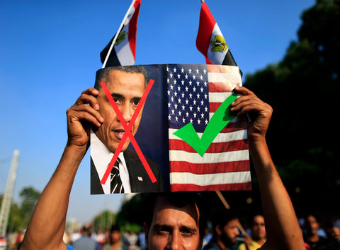Someone hung a large full-color banner in the center of the roundabout near my apartment during the demonstrations on June 30. It featured Anne W. Patterson, the U.S. ambassador to Egypt, with a red “X” across her face and the caption “Spinster, Go Home!” Patterson is married, coincidentally, but her purported bachelorette’s status was meant as a slur: Independent, single women are often viewed with pity or distrust in Egypt’s patriarchal culture. And however ludicrous an insult, “spinster” is more restrained than “pitch,” as the ambassador is frequently called in protest signage — Egyptians often confuse the English letters “p” and “b.”
Egyptians are angry with America these days.
I happen to be an American, which means that my neighbors in Cairo often chide me with questions like, “What’s the news from Obama?” as if I had an inside track on U.S. foreign policy. Egyptians’ relationship with the United States seems as personal as it is political, and I’ve watched it shift from infatuation to disappointment.
In the early 1980s, people here saw Americans as heroes, admiring the country’s prosperity and strength and its championing of civil rights. Fast-forward to post-9/11, Afghanistan, Iraq, Abu Ghraib and Guantánamo Bay: When asked about my nationality, I sometimes lied — to avoid not a confrontation but the impulse to apologize on behalf of Amrika, as they call it here.
Today I tell the truth, mostly to gauge people’s reaction, and am invariably given a message to deliver to my president. It boils down to this: Let us be. Egyptians complain that America supported the authoritarian Muslim Brotherhood, much as it did the regime of President Hosni Mubarak — meaning, at the expense of their political and civil freedoms. Patterson is an easy target for them: She met with leaders of the Freedom and Justice Party, the Brotherhood’s political arm, and she acknowledged that America has had contact with the Muslim Brotherhood for 20 years.
Egyptians love conspiracy theories, and many believe that Mohamed Morsi, the ousted president, spied for the Americans, who helped his organization into power on certain conditions, namely keeping the peace with Israel. U.S.-Egyptian relations are closely watched here, and Patterson’s remarks during a June 18speech on America’s belief in “universal rights and values” fell on skeptical ears: If the United States cared about democracy in Egypt, it wouldn’t support authoritarian regimes.
The U.S. Embassy compound near Tahrir Square admittedly is a poor advertisement for universal anything. The surrounding streets have been barricaded since U.S.-led forces invaded Iraq in 2003. For the last year, the entire area has been walled off by huge concrete blocks, forcing pedestrians like me to tramp an extra half-dozen blocks through epic traffic jams to get around it.
America long ago stopped funding the cultural outreach centers offering films, concerts, language classes and lectures that were an integral part of its public diplomacy effort. The heavily guarded embassy bunker, with its lines of weary visa-seekers, is the only direct contact most Egyptians will ever have with the United States. Although they have no illusions about their country’s shortcomings, in their estimation Americans live in a dangerously unquestioning and self-congratulatory myth.
Many Egyptians have friends and relatives working in the United States. They care about what people and policy makers over there think of them and wish the feeling were mutual. Right now, they want to be recognized as principled defenders of democracy, not victims of a military coup. Would you want to live under Shariah? they ask me, claiming that the Islamists were merely using the ballot box to impose religious rule.
But in their haste to condemn the Muslim Brotherhood for replicating Mubarak’s oppressive tactics, some Egyptians have behaved in a manner you might call un-American. Morsi remains under house arrest pending a variety of charges, and the newly appointed prosecutor-general has frozen the assets of Brotherhood leaders. The army summarily shut down Islamist TV channels, purportedly to curb incitements to violence, but the rest of the independent media “variously ignores, belittles or demonizes” the Islamist segment of society, according to the popular local blogger Sarah Carr.
Since 2011, Egyptians have learned that winning the right to choose their own government is hard but holding it accountable for how it administers power is harder still. That’s why their beef is with U.S. policies, not U.S. citizens: They have been excluded from political decision-making long enough to know that governments don’t always reflect the will of their people.
On Tuesday, walking past the banner of Patterson on the roundabout I counted 18 new identical signs, mounted there almost overnight. Intended for the media, the top line read, in English: “Administration Obama,” followed by a black “X.” The second line read, “American People,” followed by a big red heart.
About the Writer:
Maria Golia is a columnist for the Lebanon Daily Star and The National, and a permanent correspondent for The Middle East.
Source: The New York Times


